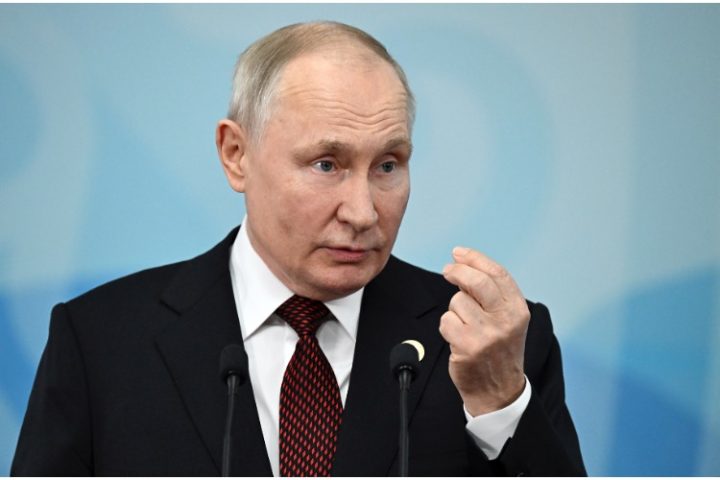
The current crisis in the Middle East, which has intensified owing to an unexpected attack by the Palestinian militant group Hamas on southern Israel, is proof of Washington’s inability to address conflicts, Russian President Vladimir Putin has declared.
“I believe many would agree with me that it is a glaring example of the failures of the U.S. Middle East policies. They tried to monopolize the peace settlement, but unfortunately paid no attention to searching for compromises that would be acceptable for both parties,” Putin stated on October 10.
Rather, Washington pressured both sides in an effort to enforce its own solutions, Putin elaborated.
The United States “never took into account the core interests of the Palestinian people,” Putin contended.
Those interests mainly entailed the establishment of an independent Palestinian nation-state, as laid out in UN Security Council resolutions, Putin pointed out.
Putin made these statements during a meeting with Iraqi Prime Minister Mohammed al-Sudani in Moscow. The Russian president said he believed the two nations were in unanimous agreement to focus on minimizing harm done to civilians on both sides of the Israeli-Palestinian conflict.
Other senior Russian officials, including Foreign Minister Sergey Lavrov, had previously lambasted the United States for renewed Israeli-Arab tensions. The top Russian diplomat hinted on October 9 that the so-called quartet of Middle East peace brokers — which includes the United States, Russia, the EU, and the UN — should steer the way in peace talks. The United States, Lavrov claimed, had glossed over this mechanism to “monopolize” the process for its own benefit.
The Hamas militant group, which is based in Gaza, conducted a surprise assault on Israeli territory on October 7, attacking the Jewish state’s air defenses with widespread rocket bombardments and staging a lightning raid. Hamas fighters also killed civilians and took hostages with plans to exchange them for Palestinian prisoners in Israeli custody.
In turn, Israel responded with a military operation targeting Gaza, claiming that its aims were to eradicate Hamas. The Gaza Strip is home to some two million residents, whose lives have been adversely affected by a long standing Israeli blockade since 2007.
The United States has vowed military support for Israel and has urged other nations to denounce Hamas for its actions. National Security Council spokesman John Kirby told reporters at the White House on October 12 that no U.S. troops would be mobilized to Israel, stating that the United States would continue to supply the Israel Defense Forces to combat Hamas.
“We have national security interests throughout the region,” Kirby said at the daily press briefing, alluding to the deployment of the USS Gerald R. Ford carrier strike group to the eastern Mediterranean, but quelled any speculations of airborne troops or Marines being deployed to Israel.
“The Israelis have made it very clear that they don’t want foreign troops on their soil, that they want to prosecute these operations on their own and they have every right to want to do that,” Kirby said. “There are no intentions, no plans to put American troops on the ground in combat.”
Besides, the United States already has “some experts” offering West Jerusalem “advice and counsel” on how to liberate hostages taken by Hamas, and maintains a “terrific information and intelligence-sharing relationship” with Israel, as well as “a strong defense relationship, when it comes to providing weapons and munitions,” Kirby elaborated.
Moreover, the IDF is “small but very capable” and the United States is “doing everything we can to improve those capabilities,” he stated.
Previously, IDF chief of staff General Herzi Halevi admitted that the military “failed” to protect Israel and its people from the October 7 Hamas attacks, and that there would be reflection once the war against Hamas ends.
U.S. Secretary of State Antony Blinken has labeled Hamas’ assault on Israel as “the equivalent of ten 9/11s.” With Israel already retaliating by pounding large expanses of Gaza, Blinken pledged Washington’s support for its ally “as long as America exists.”
“If you look at [the attack] in proportion to the size of Israel’s population, this is the equivalent of ten 9/11s,” Blinken said in Tel Aviv on October 12. “That’s how big and how devastating the attack has been.”
Around 1,300 Israelis have been killed and over 3,000 injured since Hamas militants staged their attack last weekend.
More than 1,400 Palestinians — including 447 children — have been killed and about 5,000 more injured in the same period, with these figures continuing to increase as Israeli warplanes bomb the densely populated enclave of Gaza. Most Gazan residents are civilians, and with an Israeli-imposed siege halting food, water, electricity, and fuel, civilians have accounted for the majority of Palestinian casualties.
Energy Minister Israel Katz announced on October 12 that Israel’s siege of Gaza will not cease unless Hamas frees all the hostages it has captured.
“Humanitarian aid to Gaza? No electrical switch will be turned on, no water pump will be opened and no fuel truck will enter until the Israeli abductees are returned home,” Katz wrote on X.
In a previous post, the minister stated that Israel had for years provided Gaza with electricity, water, and fuel.
“Instead of saying thank you, they sent thousands of human animals to slaughter, murder, rape and kidnap babies, women and the elderly,” Katz said, elaborating that Israel will continue to tighten the siege of Gaza “until the Hamas threat to Israel and the world is removed.”
Israeli Defense Minister Yoav Gallant on October 9 initially declared Israel’s blockade of Gaza, saying that he had ordered a “complete siege of the Gaza Strip” and that there will be “no electricity, no food, no fuel and no water.”
“We are fighting human animals and we are acting accordingly,” Gallant declared.
In turn, EU chief Josep Borrell has contended that Israel’s economic siege of Gaza breaches international law.
Although Borrell, who heads the EU’s diplomatic service, said that “Israel has a right to self-defense,” he qualified that such actions have to be done “within international law…. Cutting water, cutting electricity, cutting food to a mass of civilian people is against international law.”



